选修9 Unit 2 导学案 教师版(有答案)
英语高三选修九新人教版Unit2:教案【第2课时】Reading
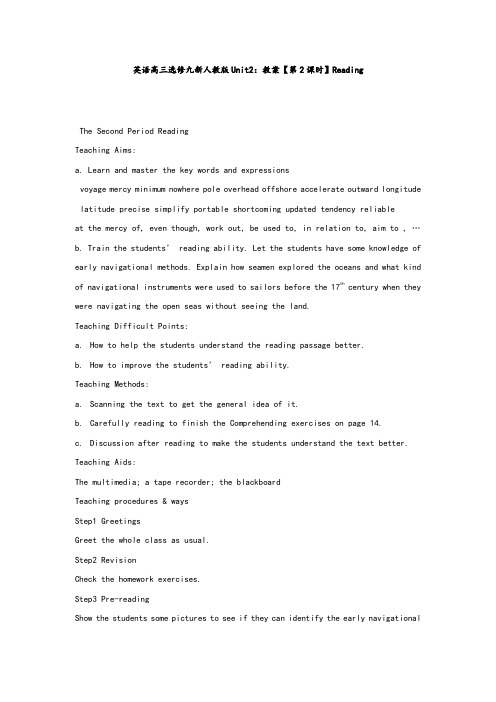
英语高三选修九新人教版Unit2:教案【第2课时】ReadingThe Second Period ReadingTeaching Aims:a. Learn and master the key words and expressionsvoyage mercy minimum nowhere pole overhead offshore accelerate outward longitude latitude precise simplify portable shortcoming updated tendency reliableat the mercy of, even though, work out, be used to, in relation to, aim to , …b. Train the students’ reading ability. Let the students have some knowledge of early navigational methods. Explain how seamen explored the oceans and what kind of navigational instruments were used to sailors before the 17th century when they were navigating the open seas without seeing the land.Teaching Difficult Points:a.How to help the students understand the reading passage better.b.How to improve the students’ reading ability.Teaching Methods:a.Scanning the text to get the general idea of it.b.Carefully reading to finish the Comprehending exercises on page 14.c.Discussion after reading to make the students understand the text better. Teaching Aids:The multimedia; a tape recorder; the blackboardTeaching procedures & waysStep1 GreetingsGreet the whole class as usual.Step2 RevisionCheck the homework exercises.Step3 Pre-readingShow the students some pictures to see if they can identify the early navigationalinstruments seamen used and explain how they used.Step 4 DiscussionDiscuss the questions on page11.Step 5 Listening and comprehendingAfter listening to the contents of the text do the comprehending exercises on page 14&15.Step 6 ExplanationAfter comprehending, it is a good time to deal with the new words and language points in this part, esp. the following:voyage mercy minimum nowhere pole overhead offshore accelerate outward longitude latitude precise simplify portable shortcoming updated tendency reliableat the mercy of, even though, work out, be used to, in relation to, aim to , Step7 DiscussionLet’s the students have a discussion by working in pairs or in groups.Topic: Imagine you are on a boat with twenty-nine other people. You have a small box for your personal things but it can only hole ten items. What would you need for a week’s journey across the North Sea to England?Suggested Answer:Step8 SummaryThis reading explains how seamen explored the oceans and what kind of navigational instruments were used to sailors before the seventeenth century when they were navigating the open seas without seeing the land.Step9 HomeworkFinish the exercises about using words and expression on page61.************************************全单元教学目标概论I. 单元教学目标Ⅱ.目标语言。
2018-2019学年高二英语新人教版选修9学案:Unit 2 sailing the oceans-词汇篇(教师版)
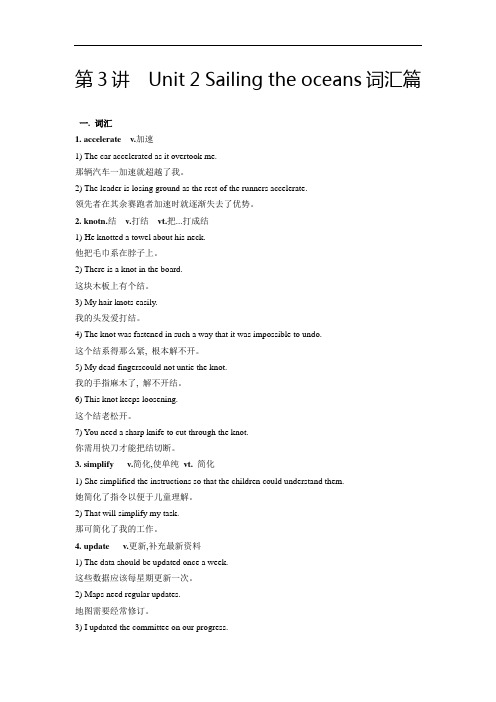
第3讲Unit 2 Sailing the oceans词汇篇一. 词汇1. accelerate v.加速1) The car accelerated as it overtook me.那辆汽车一加速就超越了我。
2) The leader is losing ground as the rest of the runners accelerate.领先者在其余赛跑者加速时就逐渐失去了优势。
2. knotn.结v.打结vt.把...打成结1) He knotted a towel about his neck.他把毛巾系在脖子上。
2) There is a knot in the board.这块木板上有个结。
3) My hair knots easily.我的头发爱打结。
4) The knot was fastened in such a way that it was impossible to undo.这个结系得那么紧, 根本解不开。
5) My dead fingerscould not untie the knot.我的手指麻木了, 解不开结。
6) This knot keeps loosening.这个结老松开。
7) You need a sharp knife to cut through the knot.你需用快刀才能把结切断。
3. simplify v.简化,使单纯vt. 简化1) She simplified the instructions so that the children could understand them.她简化了指令以便于儿童理解。
2) That will simplify my task.那可简化了我的工作。
4. update v.更新,补充最新资料1) The data should be updated once a week.这些数据应该每星期更新一次。
英语人教版选修九Unit2 Sailing the oceans导学案
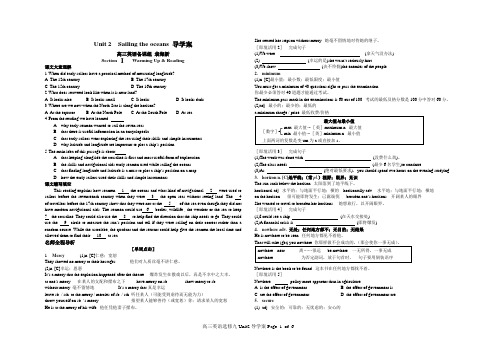
Unit 2 Sailing the oceans 导学案高三英语备课组袁海新SectionⅠWarming Up & Reading课文大意理解1.When did early sailors have a practical method of measuring longitude?A. The 12th centuryB. The 17th centuryC. The 15th centuryD. The 16th century2.What does seaweed look like when it is near land?A. It looks niceB. It looks smallC. It looksD. It looks dark3.Where are we now when the North Star is along the horizon?A. At the equatorB. At the North PoleC. At the South PoleD. At sea4.From the reading we have learned .A.why early seamen wanted to sail the seven seasB.that there is useful information in an encyclopediaC.that early sailors went exploring the sea using their skills and simple instrumentsD.why latitude and longitude are important to plot a ship’s position5.The main idea of this passage is about.A.that keeping alongside the coastline is first and most useful form of exploration.B.the skills and navigational aids early seamen used while sailing the oceansC.that finding longitude and latitude is a must to plot a ship’s position on a mapD.how the early sailors used their skills and simple instruments课文缩写填空This reading explains how seamen 1 the oceans and what kind of navigational 2 were used to sailors before the seventeenth century when they were 3 the open seas without seeing land. The 4 of travellers before the 17th century show that they were not at the 5 of the sea even though they did not have modern navigational aids. The seamen could use 6 bodies, wildlife , the weather or the sea to keep 7 the coastline. They could also use the 8 to help find the direction that the ship needs to go. They could use the 9 circle to measure the sun’s position and tell if they were sailing on their correct rather than a random course. While the astrolabe, the quadant and the sextant could help give the seamen the local time and allowed them to find their 10 at sea.名师全程导析[单词点击]1.Mercy (1)n. [C]仁慈;宽恕They showed no mercy to their hostages. 他们对人质丝毫不讲仁慈。
【精校版】高中英语(人教版 选修9)教师用书:Unit 2 Section_Ⅳ Grammar_-_Writing Word版含答案

人教版精品英语资料(精校版)Section_ⅣUsing_LanguageⅠ.高频单词点击1.survival_n.生存;幸存→survive v.幸存,幸免于2.incident n.事件;事变→incidental adj.次要的3.departure n.出发;离开→depart v.离开;出发4.crew n.(轮船、飞机等上的)工作人员;(工作)队5.deposit vt.放;(把钱)存入银行6.dilemma n.进退两难的局面7.routine n.常规;日常事务8.drawback n.缺点;障碍9.starvation n.挨饿;饿死→starve v.挨饿;饿死10.psychology n.心理学→psychologically adv.心理上地;心理学地11.tension n.紧张;不安;张力→tense adj.令人紧张的12.gradual adj.逐渐的;逐步的→gradually adv.逐渐地;逐步地13.foresee vt.预见;预知14.thirst n.渴,口渴→thirsty adj.渴的15.tear vt.扯破;撕破→tear n.泪水;眼泪16.hardship n.困苦;艰难→hard adj. 困难的17.roar v.咆哮;轰鸣→roaring adj.轰鸣的Ⅱ.重点短语必记1.take over 接管2.be caught in 遭遇到3.in addition 此外,另外4.after all 毕竟;终究5.cope with 成功地对付;应付6.take one's mind off 使某人的注意力离开……7.set loose 出发;开始8.jaws of death 鬼门关Ⅲ.常用句型必备You could not imagine a more disturbing sight than what we looked like whenarriving in Timor over forty days after being set loose in our small boat.Ⅳ.功能意念项目原因与结果(Cause & effect)Why are you ...?How could you ...?Why did you ...? Because of ...It was because ... The reason is that ...As/Since he ...Now that ... Therefore ...It was due to ... It is ..., so I'm afraid ...That's why ...He ..., so he is ill with fever after the voyage.1.survival n.[U,C]生存,幸存,残存;幸存者,残存物The man's survival was surprising, as the doctors thought he would die.这个人能活下来真是出人意料,因为医生们认为他必死无疑。
高中英语(人教版)选修九Unit2Sailingtheoceans同步课件教案课件教案和测试(参考)
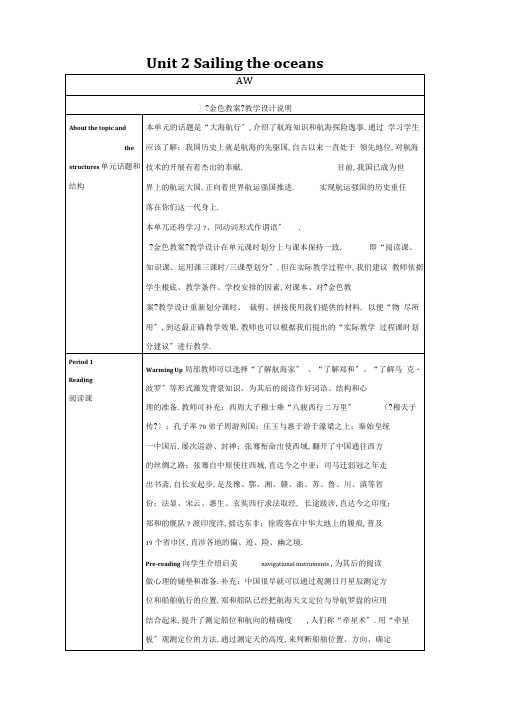
Unit 2 Sailing the oceansPart 1 Teaching Design第一局部教学设计Period 1 A sample lesson plan for reading(SAILING THE OCEANS)IntroductionIn this period, after the warming up, students will first be guided to learn about navigational instruments.Then they will be helped to read an exposition about sailing the oceans.Three “WarmingUp" designs are presented in this book for teachers reference. Computer and overhead projector may be used to a id the teaching and learning.Objectives■To help students learn to express causes and effects■To help students learn to read an exposition about sailing the oceans■To help students better understand a sailing〞■To help students learn to use some important words and expressions■To help students identify examples of the future passive voice in the textFocusAidsMultimedia facilities, tape-recorder, photos, diagramsProcedures1.Warming up(1)Warming up by leaning about navigatorA navigator is the person onboard a ship responsible for the navigation of the vessel. On aircraft, the position may also be referred to as a flight officer. The navigator's responsibilities include planning the journey, advising the captain (or pilot) while en route, and ensuring that hazards or obstacles are avoided.(2)Warming up by talking about Zheng He's Seven VoyagesIn July 11, 1405, the eunuch Zheng He of the Ming Dynasty royal court set out on his first overseas voyage.In the following 28 years, this navigator proceeded to carry out six more voyages, accompanied by a huge entourage of nearly 30,000 people. By traveling throughout Southeast Asia, and around the Indian Ocean to the Red Sea and East Africa, he also landed at over thirty different nations. He was the earliest largest scale navigation in world history, coming more than half a century earlier than Columbus'famous exploits...(3)Warming up by looking and listeningHello, class. Do you know this man? Yes, he is Marco Polo.Marco Polo (1254-1324), is probably the most famous Westerner traveled on the Silk Ro ad. He excelled all the other travelers in his determination, his writing, and his influence. His journey through Asia lasted 24 years. He reached further than any of his predecessors, beyond Mongolia to Chin a. He became a confidant of Kublai Khan (1214-1294). He traveled the whole of China and returned to tell the tale, which became the greatest travelogue.2.Pre-reading by learning about navigational instruments◊ artificial horizon, flight indicator, gyro horizon - a navigational instrument based on a gyroscope;provides an artificial horizon for the pilot◊ compass - navigational instrument for finding directions◊ depth finder - navigational instrument used to measure the depth of a body of water (as by ultrasound or radar)◊inclinometer - an instrument showing the angle that an aircraft makes with the horizon◊instrument - a device that requires skill for proper use◊asdic, echo sounder, sonar - a measuring instrument that sends out an acoustic pulse in water and measures distances in terms of the time for the echo of the pulse to return; sonar is an acronym for sound navigation ranging; asdic is an acronym for anti-submarine detection investigation committee3.Reading for formsRead the text SAILING THE OCEANS on page 12 to: cut/ the sentence into thought groups, blacken the predicative, darken the connectives and underline all the useful expressions.4.Copying useful expressions and making sentencesYou are going to copy in your notebook all the useful expressions and make sentences of your own with them.5. Transforming information Next you are going to read the text again to complete the chart below.7. Making a diagram of SAILING THE OCEAN8. Closing down by answering comprehension questions1. What is the main topic of this passage?A. The voyages of the travelers before the 17th centuryB. How to plot a ship ' s position on a mapC. How did ancient men navigate so wellD. Use nature to aid navigation2. Ancient navigators use navigational instruments to help them.A. find celestial bodiesB. predict the weatherC. explore the seaD. find latitude…,rather •・ as one of the points of3.The author of the passage implies that the ancient navigators were.A. hard-workingB. braveC. intelligentD. energetic4.According to the passage,.A.the ancient accomplished navigators were able to use South Star to plot their positions .B.Sea birds could be used to show the way to land when it was nowhere to be seen .C.Wise seamen used the snows to direct their sailing .D.The sextant proved to be the most accurate and reliable of these early navigational instruments. (Keys: BDCB )。
2017-2018学年高中英语选修9教学案:Unit 2 Section

Section_ⅡLearning_about_LanguageⅠ.高频单词点击1.swoop v i.突降;猛扑2.parcel n. 小包;包裹3.peck v t. &v i. 啄食4.cliff n. 悬崖;峭壁5.expedition n.远征;探险(队)→expeditionary adj.远征的;探险的6.compulsory adj. 必须做的;必修的7.reform n.改革;革新Ⅱ.重点短语必记1.far away from远离2.next to 仅邻着3.be determined to do sth. 决定做某事4.set out 出发;动身5.so as to 为了(做)6.owing to 由于7.be recognized as 被认定为Ⅲ.常用句型必备1.Once_there,it shook itself and threw Samuel in the approximate direction of the nest.2.There_seemed_to_be_nowhere_to_hide but then he noticed lots of seaweed on his left and quickly hid under it.3.He had not_only an outstanding ability in navigation and exploration,but_also a real concern for sailors' health.Ⅳ.单元语法聚焦The Predicate(谓语动词)[单词点击]1.swoop vi.猛扑(常与down连用);突降The bird swooped down to the lake.这只鸟猛扑到湖上。
The children swooped down to the pile of presents.孩子们向那堆礼物冲了过去。
Unit 2 Sailing the oceans 导学案2-人教选修9精品

Unit 2 Sailing the oceans导学案Step 1 Fast--Reading(1)Why are the Ming Tombs called Shisanling?(2)Apart from Shisanling, which is the most famous Ming Tomb?(3)How many Qing emperors were buried in Hebei Province?Step 2 Key words and phrases1. remain(1).verb 停留,留下,逗留;尚待…… 留待……;仍然,依然医生命令他再卧床几天。
[+ to infinitive]A great many things remain to be done (= have not yet been done).他依然保持着沉默。
(2) 剩余,残存After the flood, nothing remained of the village.________________________________the remainder noun [S] 剩余,残存之物/人,其他的人们eg. I ate most of it and gave the remainder to the dog.remainder 余数remaining adjective [before noun] 剩下的eg. Tom wants to borrow money, but I just have the remaining 20 dollars on me.remains 1. plural noun 剩余物,残留物;剩饭菜eg. The remains of lunch were still on the table.(3). n.eg. The remains of .Rome.Fifty years after he died, his remains were returned to his homeland.高考链接1. ( 2006浙江) It remains ________ whether Jim will be fit enough to play in the finals.A. seenB. to be seenC. seeingD. to see2. (2010上海春) The pilot asked all the passengers on board to remain _________ as the plane was making a landing.A. seatB. seatingC. seatedD. to be seating3. (2012南京一模) The Copenhagen meeting ends up in a broad in general but with lots of details______ in future months of the year.A. remaining to work outB. remaining to be worked outC. remained to work outD. remained to be worked out2. in good conditioncondition noun [S or U] 状态,情形,健康状态eg. The hospital say her condition (= state of health) is improving slowly.He's in no condition (= He is too ill or too drunk) to drive home.conditions plural noun (周围的)状况,情况,形势eg. weather conditions working conditionsUnder what conditions do plants grow best?out of condition 健康不佳,情况欠佳on (the) condition that 在……条件下I'll come to the party on the condition that you don't wear those ridiculous trousers! Phrases: 与……相等______________ 连同,和……一起______________对公众开放___________________ 在……中心就……而言从事;占用;拿起近几十年来历史遗址对……有益已列入……名单Consolidation:1. The blacks should _______________ the whites.2. She lost her job when the factory closed,______________ hundreds of others.3. This seaside city is second only to the capital ____________ its population.4. Sports and games ______________________ character- training.5. ______________ too much room, the table should be moved out.Step 3 Enjoy the sentences:1. The Ming and Qing Imperial tombs are ___________________________________________ (明清皇陵是世界上发现的最令人赞叹的文化遗址之一)2. Some of the pine trees which ______________were planted during the Ming Dynasty.(夹道林立的松树中有一些还是明代时种下的)3. It is ___________ Shisanling, with the other tombs_______________________.(它位于十三陵的中心,其他寝陵分列左右)4. In addition, getting these historic sites recognized by the rest of the world ________________, as it stresses to everyone their extreme importance and value.(另外,使这些历史遗址得到国际认可有助于保护和修复它们,因为这向世人强调了它们极大的重要性和宝贵价值)。
人教版高中英语选修9《Unit2Sailingtheoceans》教案
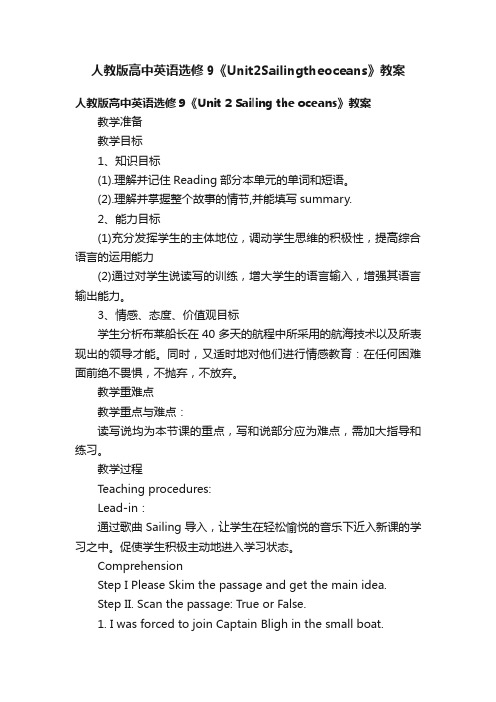
人教版高中英语选修9《Unit2Sailingtheoceans》教案人教版高中英语选修9《Unit 2 Sailing the oceans》教案教学准备教学目标1、知识目标(1).理解并记住Reading部分本单元的单词和短语。
(2).理解并掌握整个故事的情节,并能填写summary.2、能力目标(1)充分发挥学生的主体地位,调动学生思维的积极性,提高综合语言的运用能力(2)通过对学生说读写的训练,增大学生的语言输入,增强其语言输出能力。
3、情感、态度、价值观目标学生分析布莱船长在40多天的航程中所采用的航海技术以及所表现出的领导才能。
同时,又适时地对他们进行情感教育:在任何困难面前绝不畏惧,不抛弃,不放弃。
教学重难点教学重点与难点:读写说均为本节课的重点,写和说部分应为难点,需加大指导和练习。
教学过程Teaching procedures:Lead-in:通过歌曲Sailing导入,让学生在轻松愉悦的音乐下近入新课的学习之中。
促使学生积极主动地进入学习状态。
ComprehensionStep I Please Skim the passage and get the main idea.Step II. Scan the passage: True or False.1. I was forced to join Captain Bligh in the small boat.2. After the crew took over the ship “Bounty”, Captain Bligh was allowed to take with him a chart , a compass and a quadrant.3. It was very difficult for us to get a correct reading from the quadrant as the boat moved constantly during the course.4. Captain Bligh used a system called “dead reckoning” and he knew there was land directly southwest of their original position.5. Captain Bligh was as weak as the rest of us but he was determined not to give up.6. Captain Bligh kept us busy and tried to take our minds off our stomachs and thirst all the way.7. We finally escaped the jaws of death and arrived in Timor over fifty days after being set loose in our small boat.Step III. Group work: further reading.When captain Blight returned home he was honored as a hero. Discuss in groups whether he should receive a special medal or not.Step IV. Affective educationAfter learning the text, as senior three students, what can we learn from Captain Blight in our life?Step V. Summary:I am _____ to have sailed with Captain Bligh on his journey of over40 days through about4,000 miles in an open boat ______the Pacific Ocean in 1789.In the beginning, on our ________(depart), some of the crew took _____theship and the captain ___________(deposit) into a small boat. Thus we werecaught _____a dilemma. We decided to stick with him _______thick and thin though we seemed to face _____uncertaindeath.During the long and toughjourney, we encountered manyunexpected hardships. Despite _____(lack) of foodand water, he kept us _______(occupy) and cheerful to take our minds ____troubles. All the way he taught us how to cope _______various situations. Finallythey arrived at Timor __________(success) andthey were honored as _______(hero).The story shows that one man’sspirit and his determination should not ________ (defeat) by circumstances.Complexsentences(分析并翻译1-2个长难句)Challengeyourself!---Grammar Filling1. I’m proud to have sailed withCaptain Blight ____his journey of over 40 days _________about 4,000miles ____anopen small boat _______ the Pacific Ocean.2. On our _________(depart) from T ahiti, some crew took _____the ship. And those of us onboard ____________(catch) in a dilemma.3. As you can see from the map we kept_____a straight course pretty well.4. The captain kept us busy________ (read) the tables to work out our position .5. It was the extreme lack of waterthat was hard to cope with ______________ (psychology)6.He kept us busy and tried to take our minds课后习题Challenge yourself!---Grammar Filling1. I’m proud to have sailed with Captain Blight ____his journey of over 40 days _________about 4,000miles ____an open small boat _______ the Pacific Ocean.2. On our _________(depart) from T ahiti, some crew took _____the ship. And those of us on board ____________(catch) in a dilemma.3. As you can see from the map we kept _____a straight course pretty well.4. The captain kept us busy________ (read) the tables to work out our position .5. It was the extreme lack of water that was hard to cope with ______________ (psychology)6.He kept us busy and tried to take our minds _____our __________(stomach).。
- 1、下载文档前请自行甄别文档内容的完整性,平台不提供额外的编辑、内容补充、找答案等附加服务。
- 2、"仅部分预览"的文档,不可在线预览部分如存在完整性等问题,可反馈申请退款(可完整预览的文档不适用该条件!)。
- 3、如文档侵犯您的权益,请联系客服反馈,我们会尽快为您处理(人工客服工作时间:9:00-18:30)。
Book 9 Unit 2 Sailing the oceans 导学案教师版SAILING THE OCEANSI. Important words and expressions1. Words①_minimum_ adj. 最小的;最低的②pole _ n. 地极;柱;杆③_secure _ adj. 安全的;可靠的④__awkward_ adj. 难使用的;笨拙的⑤_simplify _ vt. 单一化;简单化⑥__shortcoming_ n. 缺点;短处⑦_reliable _ adj. 可靠的;可信赖的⑧__tendency_ n. 趋向;倾向2. Phrases①受…支配___at the mercy of __ ②解决;算出;弄懂____work out___③接近;靠近__close to __ ④海里____nautical mile __⑤set loose __出发;开始_____ ⑥jaws of death __鬼门关___II. Reading and Comprehending1. Fast readingWhat did people use to help sailing?①nature → ___celestial bodies__ , wildlife, __weather_ , sea .②instruments → _knot_ , compass, __bearing circle_ , _astrolabe_ , quadrant, __sextant_.2.Careful reading. Choose the best answer.①How many traditional methods used by seamen are mentioned in the text? AA. Four B .Five C. Eight D. Ten②By studying the wind ,seamen could __C_____.A. tell the distance they had coveredB. know how far away they were awayC. judge the direction of shipD. make their journey meaningful③Latitude and longitude are used to help seamen know ___B____.A. how far away they are from landB. where they are in the oceanC. the right direction of the courseD. the direction of the ocean currents④In order to calculate the speed of their ship, seamen used to use __D____.A. the compassB. a ropeC. a logD. both B and C⑤which is the correct order of the development of navigational instruments? CA. The compass-the sextant-the quadrant-the astrolabe-the bearing ciraleB. The bearing circle-the astrolabe- the sextant- the quadrant- the compassC. The bearing circle- the astrolabe- the quadrant- the sextant- the compassD. The astrolabe- the bearing cirale- the sextant- the quadrant- the compass⑥Which is fit to describe this passage? It is a __B_.A. narration (记叙文)B. exposition (说明文)C. prose (散文)D. poem3. Comprehending.1)Read the passage and answer the following questions.What is the use of a bearing circle, astrolabe, quadrant or sextant? ( B )What is the use of a compass? ( A )A to set the course of the shipB to measure the position of the shipC to measure the speed of the shipD to tell the time2)Why are speed and time important in working out the longitude (经度) of a ship?Because the earth moves fifteen degrees westwards every hour. If you know your direction, speed and time, you can work out the approximate longitude or change in your position in relation to the stars.(P13)3)Why is the position of the sun and various stars useful for working out latitude(纬度)?The position of the sun and stars are useful for working out latitude because they are fixed points in the sky and their movements in relation to the earth are already known. So they can be used to measure a ship's position.(P13)III. Language Learning1.The seems to have been the first and most useful form of exploration, which carried the minimumamount of risk.1)在seem后接动词不定试的完成式seem to have done/been表示该动作发生在seem之前_, 如:a)He _seems to have lost confidence_ in himself. (他似乎对自己失去了自信)b)They don’t seem to __have grasped/understood__ what I meant. 他们好像还没明白我的意思。
2)minimum 在本句中作形容词,在其它情况下也可作名词,多用_单数_形式,其复数形式是_minima_ 或_minimums.2.As the ship advanced through the water the knots were counted as they passed through a seaman’s hands.句中的as 引导状语_从句,表示__当…时候;与…同时_的意思。
The phone rang just as I was leaving the house. 我刚要出门,电话就响了。
3.However, it was awkward to use as one of the points of reference was the moving ship itself.it 指上面提到的“罗盘”,awkward 的意思是not convenient, difficult; as 的意思是_because.it was awkward to use 可理解为:It was awkward to use the astrolabe. 这个句子的it 又可以作一个形式主语,真正的主语是_to use the astrolabe_IV. Exercise.1.单句语法填空1)However, it was awkward_ to use as one of the points of reference was the moving ship itself.2)This was a more precise and simplified_ version of the astrolabe.3)It proved to be the most accurate and reliable_ of these early navigational instruments.4)This seems to have been the first and most useful form of exploration which carried the minimum__amount of risk.5). Once we were at sea, our routine_ every day was the same.6)There is a special cloud formation which indicates_ there is land close by.7)Seamen could follow the birds to land even if they were offshore_ and in the open sea.8)Wise seamen could accelerate__ the speed, but they could also be dangerous.9)There is no secure_ method of measuring longitude until the 17th century when the British solved thistheoretical problem.10)An early method of measuring speed involved throwing a knotted__ rope tied to a log over the side ofthe ship.11)The compass has a special magnetic_ pointer which always indicates the North Pole.2.翻译句子1.我们很可能感到奇怪,在经纬度用来在地图上标出船只位置之前,海员是如何对海洋探索的。
